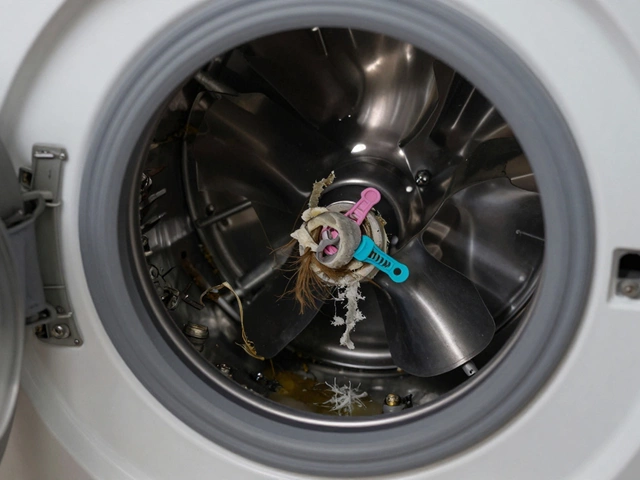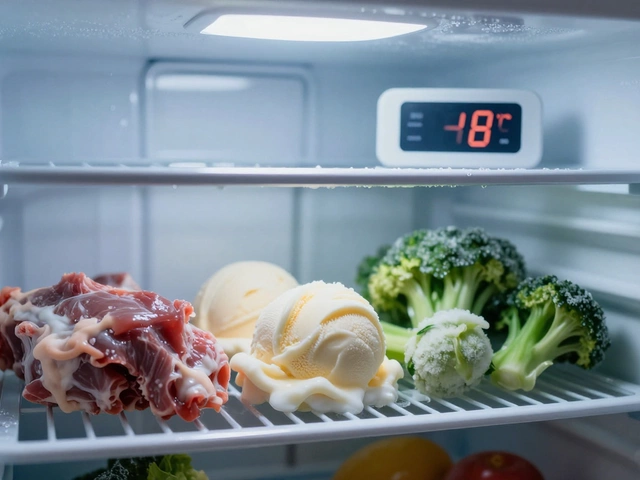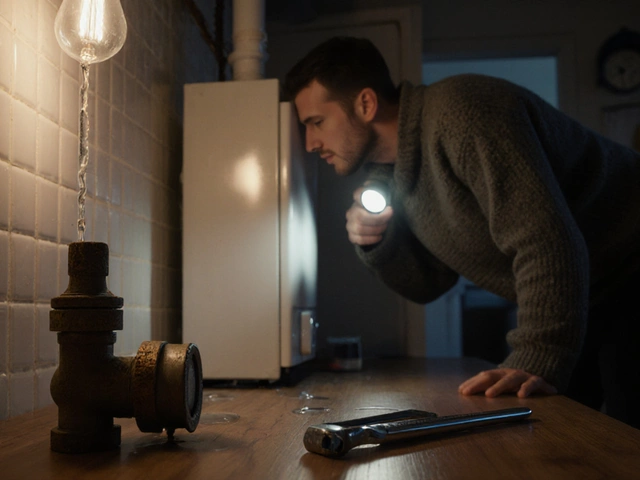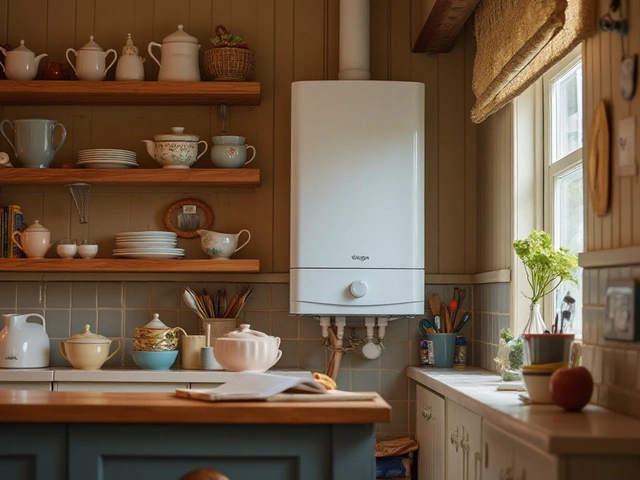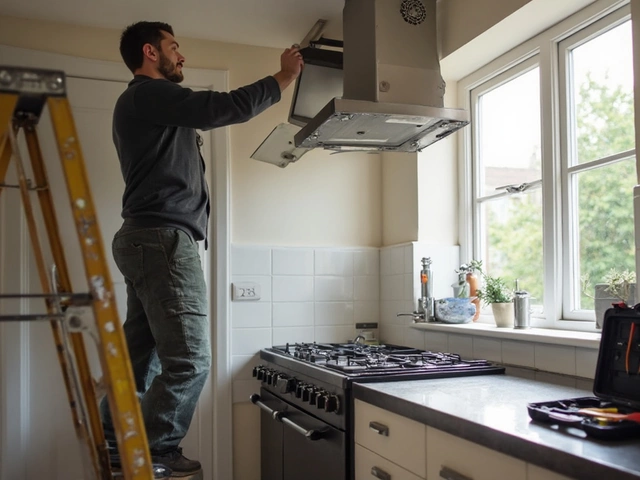So, your boiler's on the fritz, and it's not the best time for a cold shower. First things first, it's crucial to know some common signs of a boiler breakdown. Maybe it's making weird noises, leaking, or just not heating up like it used to. Understanding these signs can save you time and stress when things go wrong.
Once you've figured out there's an issue, the natural instinct is to call for help. But who do you call? Typically, you’ll want a professional heating engineer or an emergency plumber. Picking the right person for the job is critical to ensure it's fixed right the first time.
Before you grab your phone, let's take a quick look at what might be the problem with a bit of DIY inspection. Sometimes, a simple reset or checking the thermostat's settings could do the trick. However, if you feel out of your depth, don't hesitate to call a pro. In the long run, calling early can prevent more serious damage.
- Recognizing Boiler Issues
- Who to Call First
- Finding a Reliable Repair Service
- Quick Troubleshooting Tips
- Boiler Maintenance Tips
Recognizing Boiler Issues
Before you panic and start searching for a boiler repair expert, understanding the symptoms of a struggling boiler can really help. There are a few common signs that may indicate it's time to get professional help.
Strange Noises
If your boiler starts gurgling, banging, or whistling, that's a red flag. These noises often mean there's air in the system or maybe a little more serious issue with the circulation pump. It's better to have a heating services professional take a look before it worsens.
Frequent Shutdowns
Does your boiler turn off for no reason? It's annoying and could point to a bigger problem, like a thermostat or pressure issue. Double-check the thermostat settings, but don't shy away from contacting an emergency plumber if the problem persists.
Leaks and Drips
Water pooling around the base of your boiler is never a good sign. It can indicate a broken seal or, worse, corrosion within the boiler itself. In these cases, definitely call in a boiler repair expert to prevent water damage or boiler failure.
Inadequate Heating
When your radiators are colder than a snowman’s toes, it's usually an indicator of low pressure or a malfunctioning thermostat. A quick check on the pressure gauge might solve things if it’s low, but let's face it, if it’s not that simple, you'll need a pro.
| Issue | Possible Cause |
|---|---|
| Gurgling or banging sounds | Air in the system or pump issues |
| Boiler switching off | Thermostat malfunctions or pressure issues |
| Leaks or drips | Corrosion or seal failures |
| Cold radiators | Low pressure or thermostat issues |
Spotting these signs early not only saves you money but also helps avoid the headache of a full boiler breakdown. Knowing when to call for professional help can make all the difference in keeping your heating system running smoothly.
Who to Call First
Finding yourself with a broken boiler, you're probably wondering who to dial up first. It's key to reach out to the right professional to ensure a quick and proper fix. In most cases, a certified heating engineer or experienced emergency plumber is your go-to.
Emergency Plumber vs. Heating Engineer
So, how do you decide between a plumber and a heating engineer? Heating engineers specialize in boilers and are trained to handle specific boiler repair challenges. If you suspect it's purely a boiler issue, they're your best bet.
On the other hand, if you notice other plumbing problems like leaks, an emergency plumber might be the first call. They can tackle both small leaks around the boiler and help assess if the issue is more widespread in your plumbing system.
Check for Qualifications
Before contacting anyone, check their qualifications. Look for certifications like Gas Safe registration in the UK. This ensures the person you call knows their stuff. If they're on a recommended trade body list or .accredited by recognized standards, it's usually a good sign.
Availability and Response Time
Time often matters when the boiler's acting up, especially in the dead of winter. Some services offer 24/7 support, vital for emergencies when you need swift intervention. Ask about their response time so you can minimize downtime as much as possible.
Cost and Reviews
No one likes hidden costs. Always ask for a rough estimate, even if it's over the phone. Additionally, check out reviews or testimonials online. Honest feedback from others gives you a better idea of who you can trust for reliable heating services.
Handling a broken boiler doesn't have to be overwhelming. By choosing the right expert from the get-go, you'll be back to warm showers in no time!

Finding a Reliable Repair Service
When your boiler acts up, finding a reliable repair service can feel like searching for a needle in a haystack. However, it's easier than it seems if you know where to look and what to ask. Here's how you can streamline the process to get your heating system up and running efficiently.
Check Online Reviews and Ratings
The internet is your friend here. Platforms like Yelp, Google, and Trustpilot are teeming with customer reviews and ratings for local heating services. Look for companies with consistently high ratings and positive customer feedback. Pay attention to specific comments about repair speed, professionalism, and customer service.
Ask for Recommendations
Word of mouth is still king. Ask neighbors, friends, or family members if they've had any good (or bad) experiences with local repair services. Personal recommendations often lead to discovering hidden gems that online searches miss.
Ensure Proper Licensing and Certification
Always verify that the repair service has proper licensing and certification. This information is usually available on their website or can be confirmed by asking directly. Technicians should be Gas Safe registered, ensuring they're qualified to handle boiler repairs safely.
Get Multiple Quotes
It's a good idea to get quotes from at least three different services before making a decision. This helps you gauge the average cost and avoid overpaying. Be wary of estimates that are significantly lower than the others; you might be sacrificing quality or dealing with hidden fees.
Questions to Ask Before Hiring
- What is your experience with my specific boiler brand?
- Do you offer any guarantees or warranties on your work?
- Are your technicians trained and certified?
- Can you provide references from previous clients?
Being armed with the right questions not only gives you peace of mind but also shows the repair service that you mean business.
| Service | Average Cost ($) | Response Time |
|---|---|---|
| Small Repair | 150 | 1-2 days |
| Major Repair | 500 | 3-5 days |
| Emergency Service | 1000 | Within 24 hours |
Choosing the right repair service for your broken boiler could mean the difference between a quick fix and a long haul without heat. By following these tips, you're setting yourself up for a hassle-free repair experience.
Quick Troubleshooting Tips
If your boiler is having a tantrum, try not to panic. Before calling an expert, there are a few things you can check yourself. Don’t worry; I’m not about to suggest anything involving a wrench or screwdriver.
1. Check the Power Supply
Let’s start with the basics. Make sure your boiler is actually plugged in and the circuit breaker hasn’t tripped. It sounds simple, but sometimes a power glitch is the culprit.
2. Look at the Thermostat
Is the thermostat set correctly? Someone might have changed it by accident, or maybe the batteries need replacing. Make sure it’s set to both the right temperature and mode. A wonky thermostat isn't great for keeping the house warm.
3. Check the Pressure
If your boiler has lost pressure, it won’t work properly. Take a look at the pressure gauge; it should be between 1 and 2 bar. If it’s lower, you might need to top it up. Check the manual on how to do this safely or get a professional if you’re unsure.
4. Bleed the Radiators
Cold spots on radiators can mean there's trapped air inside. Bleeding them—releasing the air—often solves this problem. It’s an easy fix with a radiator key, just be careful as the water can be hot.
5. Reset the Boiler
When all else fails, give your boiler a reset. Just like a phone, sometimes turning it off and on again can work wonders. Ensure you follow the manufacturer’s instructions for resetting.
These tips are handy for quick fixes but don’t replace professional help. If your boiler isn’t kicking back into life, it's best to call in a pro who knows their stuff. Taking action early can save you cash and hassle down the line.
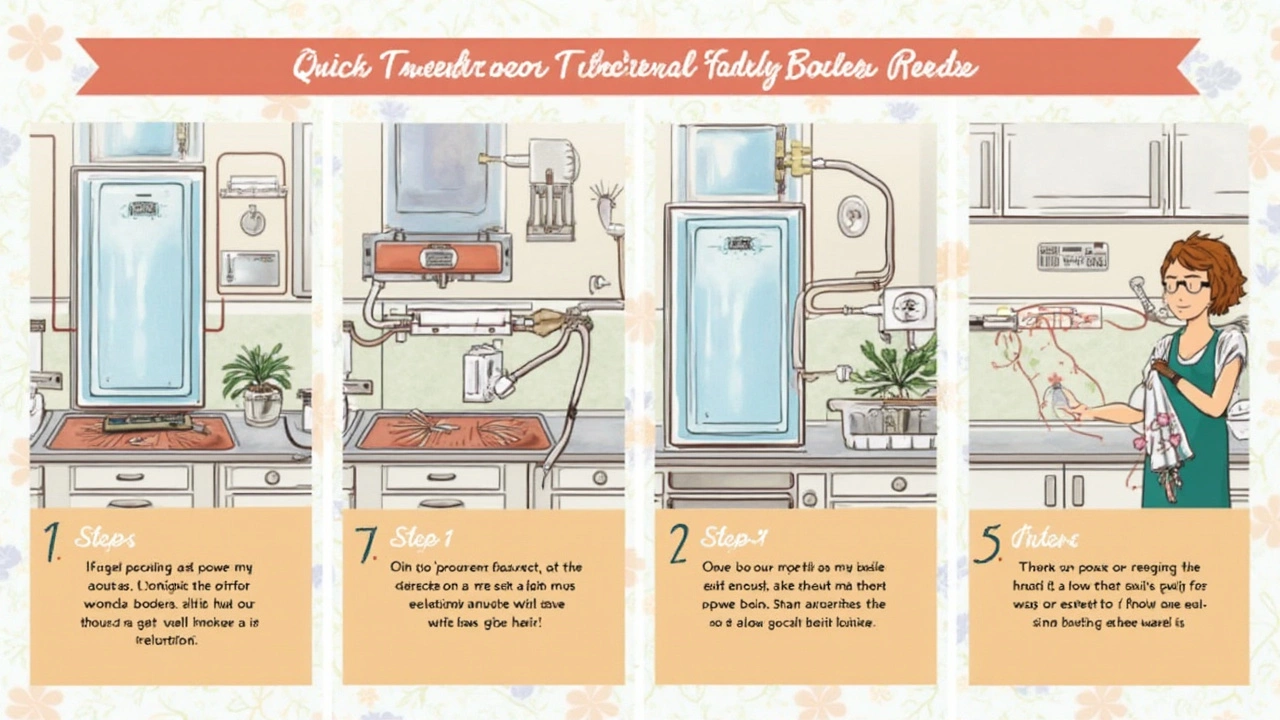
Boiler Maintenance Tips
Keeping your boiler in tip-top shape avoids those awful surprise breakdowns, especially during a chilly spell. Regular maintenance isn't just about keeping the heat on; it's also about saving money on energy bills and extending the device's life.
Annual Professional Check-Ups
It's a no-brainer to have a heating services pro give your boiler a once-over each year. This isn't just smart; it's often required to keep your warranty intact. A pro will check gas pressure, flow rates, and inspect key components to make sure everything is running smoothly.
Regular Cleaning
Dirt and grime can cause your setup to run inefficiently. Make a habit of cleaning the exterior and vents regularly. A dust-free boiler is a happy boiler! Plus, this small task helps prevent larger issues from developing.
Bleed Your Radiators
If you notice that your radiators are only heating at the bottom, it's time to bleed them. Trapped air in your heating system can affect the performance of your boiler. You'll need a radiator key (or a flathead screwdriver) to release the excess air. It's a simple task that can make a big difference.
Check the Pressure
A boiler's pressure should usually sit between 1 and 1.5 bar. Anything below that and your heating efficiency might dwindle. Most boilers have a pressure gauge that’s easy to access. Sometimes, just tweaking the pressure relief valve is all it takes to get everything back in order.
Insulate Pipes
Finally, don't forget about those pipes! Insulating your pipes keeps the water warm with less energy use, avoiding pipe freezes during a cold snap. Simple foam tubing from a hardware store does the trick.
Remember, a few easy steps now can prevent headaches down the road. Regular care means fewer boiler repair calls.

